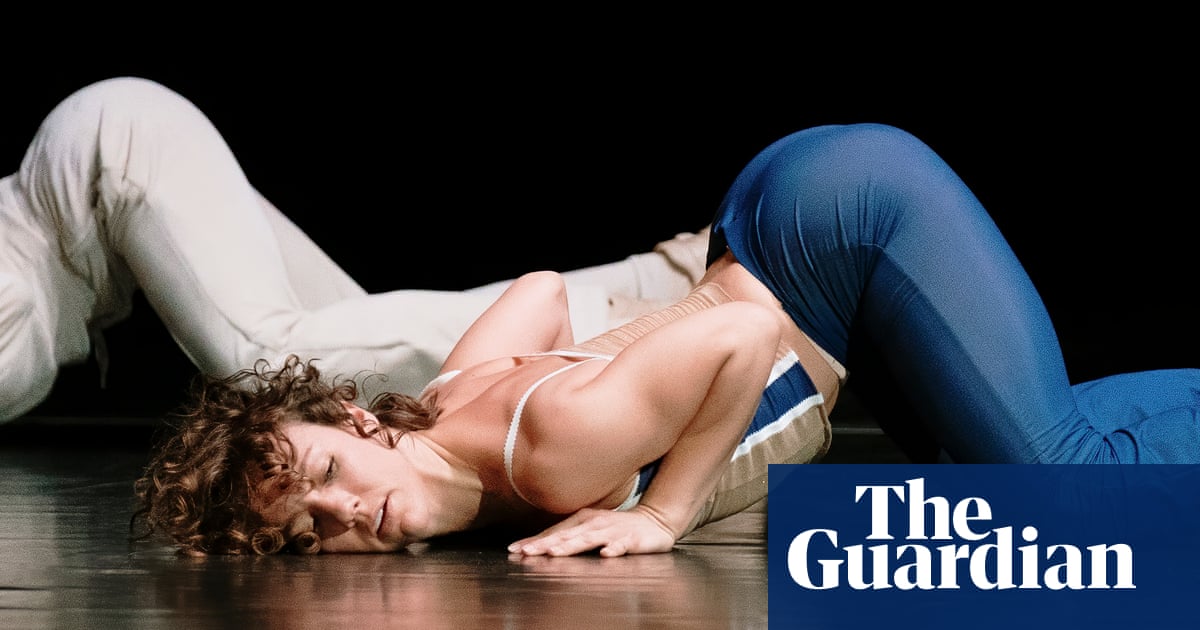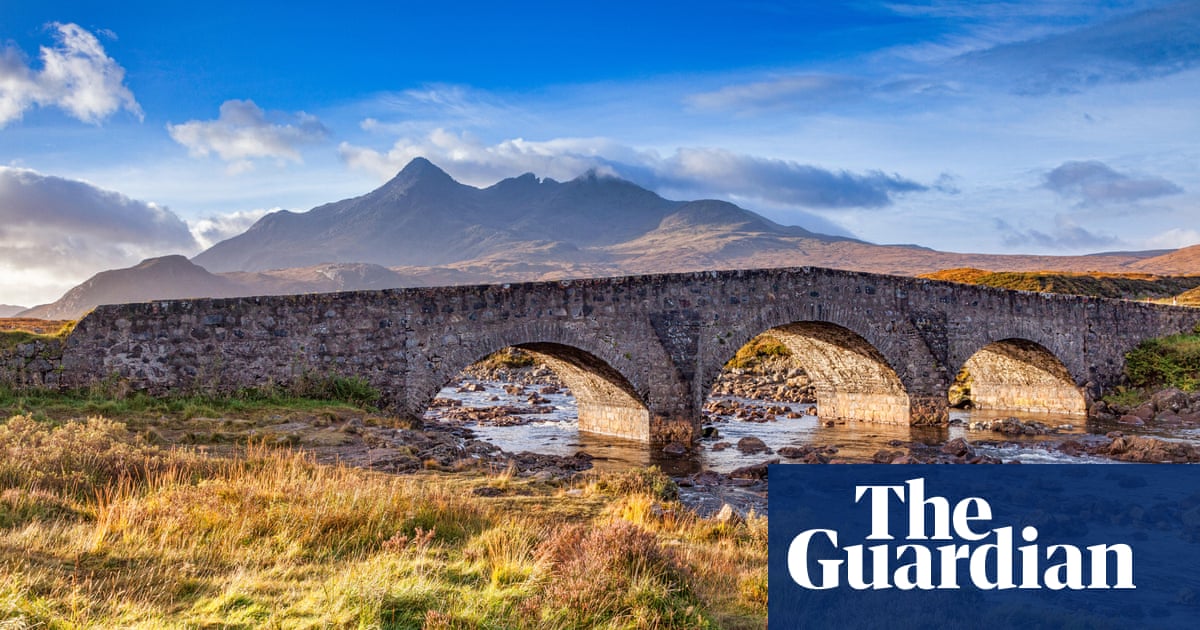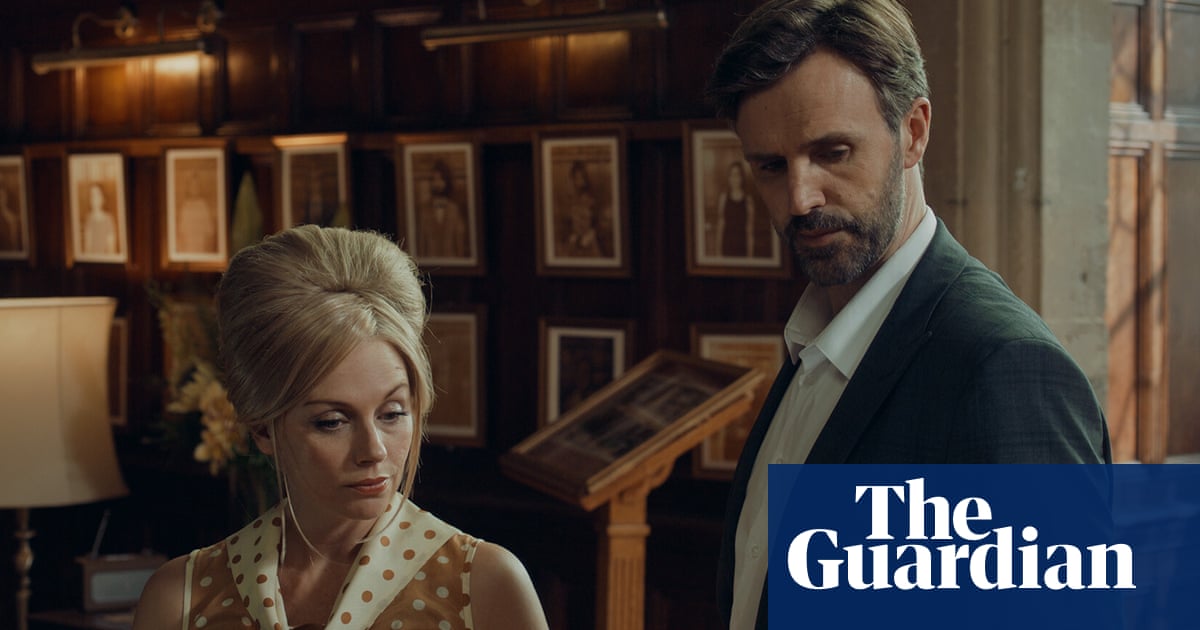
Twenty-five years ago this June, 64 people living on a remote Scottish island did something extraordinary: they bought the land they called home. They did so through their own international fundraising and thanks to the kindness of one particularly generous (and still anonymous) donor. By doing so, they said goodbye to the cast list of wealthy eccentrics who had owned the island and ruled their lives: the beret-wearing artist who turned out to be a fraud; the retired Olympic bobsleigh champion; the many lairds throughout the centuries who had made the islanders’ tenancies – their existences – insecure. Since 1997, the isle of Eigg in the Inner Hebrides has instead become a beacon for new ways of living, powered by renewable energy from water, sun and wind and the glut of creative people who live there.
Why the island’s story hasn’t yet become the subject of a heartwarming British film is a mystery, but – in Eigg’s silver jubilee year – it has become the subject of an album. Island Family is wild, rangy and dramatic, as befits its staggering landscapes and characters through Eigg’s darker history, and it was made by one of its own – Johnny Lynch, AKA the renowned Scottish musician Pictish Trail, who has spent the past 20 years making psychedelic, genre-hopping electronic pop and indie. He has also co-managed two of Scotland’s most vital independent labels, the folk-leaning Fence Records and the more wide-ranging Lost Map (although he is signed to a bigger label, the London-based Fire Records).
Lynch moved here a decade ago with his partner, Sarah, who lived here as a child; she now runs one of the island’s two sheep farms, and they have two children together. But before 2020, Lynch spent much time away to record and tour with a vast variety of artists: he counts Hot Chip, Kieran Hebden (also known as Four Tet), KT Tunstall and Self Esteem among his musical friends. Then came Covid-19. Forced to spend all his time away from the mainland (Eigg is 14 miles from the port of Mallaig on Scotland’s west coast), he was driven to think about who he was: an outsider who had somehow become a vital part of a remote community. “Being in Eigg has always felt like a dream, and it still feels like a dream,” he says at one point in my three-day island visit. “It doesn’t feel real. And I still hold on to the fact that it doesn’t feel real. That keeps it magical.”
To tell the story of Eigg, I have to get there first: I discover that this is often impossible in winter. My journey begins in Wales at 4.30am one Tuesday in February, travelling 12 hours across Britain by train and bus to Mallaig. The next morning I meet Lynch, wearing a brightly coloured Lost Map bobble hat on his head, to catch one of only four weekly ferries to Eigg. He sailed over two days earlier, just in case the weather meant my ferry was cancelled, which isn’t unusual, he explains. “But I’ve lived the high life since Monday. I’ve had a long sleep, sorted the car MOT and got a slice of angel cake from Morrisons in Fort William.” Appreciating the little things is something you learn quickly up here, he says, laughing.
The winds dip under 35mph and we bumpily set sail. Eigg looms into view 70 minutes later. It’s a breathtaking sight, formed by volcanic eruptions, basalt and red bulks of rock that create several mini-Grand Canyons. An hour later we’re in Pictish Trail HQ, a timber-framed house full of kids’ toys, muddy wellies and shelves and shelves of vinyl, not far from the island’s highest peak, An Sgùrr, a thumb of black volcanic rock from an eruption around 50m years ago.
I stay in the small bothan (hut) where Lost Map have hosted week-long residencies for musicians since 2018 (US band Grandaddy’s lead singer Jason Lytle and Swedish singer-songwriter Monoganon have been guests).
Lynch tells me Eigg is the first place where he has really felt settled. Born in Edinburgh in 1981, he had an itinerant childhood, moving around Scotland and England with his midwife mum and HR manager dad. At 13, the family moved to suburban Connecticut: “Nobody understood what the hell I was saying in my wee, high Scottish voice!” He found solace at a local record shop, Secret Sounds, spending “four to five hours at a time” poring through US R&B and hip-hop; here he also fell in love with Scottish bands such as the Beta Band and Belle and Sebastian.
Lynch’s first two solo albums – 2008’s Secret Soundz Volume 1 and 2013’s Volume 2 – pay tribute to that shop’s legacy: it closed in 2000. Its shop owner also convinced Lynch to go to university near where his favourite bands came from, which is why he ended up back in Scotland in 1999, at the University of St Andrews, only 10 miles from where the Fence Collective (a group of folk-influenced musicians including King Creosote and James Yorkston) were putting on gigs.
By 2003 Lynch was co-running the label, and a year later he was also organising Fence’s festival, Homegame, booking acts such as Four Tet and Hot Chip’s Alexis Taylor (with whom he’s collaborating again later this year). I met Lynch back then, and remember being astonished by how full of energy and ideas he was; his gigs were also energetic, DIY-fuelled pop shows, full of costumes, makeup, synthesisers and samplers. They still are: he’s the only artist to play every single Green Man festival since its inaugural outing in 2003.
Lynch took that get-up-and-go with him to Lost Map Records, which he set up in 2013, and to its Howlin’ Fling festival on Eigg, which has brought the likes of Sea Power and Cate Le Bon to the island. Surrounding himself with musical people “helped me create little communities”, Lynch explains – but in March 2020 all those real-world connections were cut. Ironically enough, Lynch had just released his buoyant fourth album, Thumb World, about the digit that separates humans from animals, and what our digital lives lead us to miss. Now he found himself working online, around home schooling his kids, to make sure Lost Map survived. “And funnily enough,” he says, raising his eyebrows, “we’ve had quite a good pandemic.”
Turbo-powered by the high-speed fibre internet installed by one of the newcomers on the island, Lost Map set up a subscription club, sending out postcards, badges, discounts and exclusive releases to its members – another community strengthened. Also, when Sarah wasn’t out lambing in the mountains (“lambing doesn’t stop for Covid”– it’s a job that involves trying to save newborn lambs being eaten by crows, often in dreadful weather, so he knows he’s the lucky one), Lynch started running and swimming. It’s often hot in Eigg in the summer, he adds, because of its proximity to the Gulf Stream; he started seeing the island’s dramatic contrasts in a dazzling new light.
“I realised I wanted to make a record in which I tried to write not about the island, exactly, but with the island,” he remembers. “But I didn’t want to do anything plaintive, because Eigg’s not plaintive. When you surrender to nature here, nature is going ‘I’ll tell you what’s what’ – and because the landscape is so dramatic geologically, history is just in your face constantly. I needed the music to acknowledge that.”
Influenced by one of his favourite bands, Underworld, as well as glam-rock, psychedelia, DIY electronica and noise, the album is quite the trip. There’s blissful pop on Melody Something, which references Eigg’s Singing Sands, a beach glistening with quartz that squeaks when you walk on it. The glitchy The River it Runs Inside of Me is inspired by a feverish dream in which Lynch lay down in Eigg’s waters, feeling the “river’s continuum/ Dripping all my toes in the waters of time”.
The climate crisis also inspired Nuclear Sunflower Swamp and Natural Successor, the latter driven by a scuzzy two-note bassline, which talks of floods, fires and hurricanes, and how “the fault” – not geological but human – “is ours”. Then comes the title track, about “everyone who has died on the island”, Lynch says – gallows humour runs through his veins. It alludes to an underworld ceilidh, a bench dedicated to an islander, Brigg, who died in a car crash (a bottle of whisky is always left under it for the sitter to toast him), and Massacre Cave, where 400 people – almost the entire population of Eigg – were choked to death in the 16th century by rival clansmen filling the cave mouth with wet straw and setting it on fire.
Before taking his work to his longtime producer, Rob Jones, putting the album together alone in the bothan made Lynch realise that he’s “always writing about feeling isolated, but I kind of enjoy that feeling. Being in Eigg, I can be isolated, but I’m also in a welcoming community of people who let me get on with my own thing – there’s a contradiction there that works.” Later, he talks about the year that he moved here, not long after his mother died of pancreatic cancer, and how welcomed he felt. “There are people who’ve moved here for their own reasons, to escape or to do things on their own terms, so in a way you don’t have to be accountable to anyone; but yet, to some extent, you become accountable to everyone as part of a self-sufficient, disparate community.”
It’s definitely not for everyone, he adds: some people have arrived in Eigg full of utopian visions in the summer, only to leave after winter. “You have to work at it – and for me, it was exactly what I needed.” He shakes his head. “You need to be a certain type to thrive here.”
The next morning we tour Eigg good and proper. In the village hall I meet Dougal, a shy, ex-Manchester Academy sound engineer who has started up soup lunches to keep the community together while the island’s harbour tearooms are being refurbished. On Saturday he’s running a Valentine’s Day disco after showing the Six Nations rugby on a cinema screen kit that’s travelling around the Small Isles. Johnny is DJing 1990s pop classics. “Someone’s making a love potion cocktail,” Dougal grins.
On the walls are newspaper cuttings featuring previous Eigg owners, such as Marlin Maruma, who bought Eigg for £1.5m in 1995 and – bizarrely – planned to set up an operatic college with the Luciano Pavarotti Foundation, until he was exposed as a fraud. There are many stories about Keith Schellenberg, who owned Eigg for 20 years, prior to Maruma. He was known as Toad of Toad Hall – Lynch’s partner remembers him speeding his Rolls-Royce around the island wearing driving goggles when she was a child.
On the way to the stunning Bay of Laig we pass the island’s primary school (current intake, six pupils) and Ben Cormack, who plays in Eigg’s metal band the Massacre Cave. We rummage around the colourful, jumble-filled swap shop, and a post office and croft that are local history museums. At Grulin, Lynch takes me around an abandoned township, the stone foundations of crofters’ huts still looming up from the land. “Weirdly, this place makes you realise how life can change,” he says. He adds that he made the video to Natural Successor here on the weekend of his 40th birthday last September, his friends running around wearing brightly coloured papier-mache heads; he’s just finished another video made via Zoom, It Came Back, featuring another good friend, comedian James Acaster, who mock-interviews Lynch before everything goes insanely psychedelic again.
One reason why Eigg has adapted, flourished (the community has grown from 64 to 110) and survived is Maggie Fyffe, the Lancastrian who led the campaign for the islanders’ ownership of Eigg in 1997. We track her down. At 74 she is still working as the administrative secretary of the Isle of Eigg Heritage Trust.
Warm and funny, with a Bolton accent, her long silver hair and rolled cigarette are both traces of her hippy youth with her husband. “We’d gone hitchhiking around Afghanistan, then just turned up at people’s farms in Scotland looking for work. We were everyone’s worst nightmare,” she says, with a gutsy, dirty laugh.
The couple came to Eigg by chance, after Schellenberg swept into a craft centre in Aberdeenshire: he said he was looking for people “like them” to come to his island. He wasn’t the best landlord: “He tried to kick me out of my house when I was pregnant years ago. Look at us now.” Her daughter works on forestry projects on the island, planting trees; Fyffe herself is currently planning the 25th anniversary celebrations in June, featuring Scottish folk-fusion band Shooglenifty, after which she says she will finally retire.
Fyffe has remained tight-lipped for years about the secret donor who secured the community purchase, and nothing will shift her on that now. She’s clearly quite moved about the forthcoming anniversary, though, especially after the past two years. “I can’t quite believe it’s happening.”
She’s delighted by the way Eigg has managed to thrive. Most people live here permanently, she says, and most holiday lets are bothans owned by residents who live nearby (“we’ve been lucky that way”). Today, she is selling electricity cards to islanders: Eigg Electric has provided 24-hour renewable power for the island since 2008 (unsurprisingly, a lot comes from the wind). The high-speed internet means islanders can work remotely.
Initiatives such as Creative Scotland and European Union money have helped Eigg develop. Lynch says the loss of European funding is devastating (“especially as we didn’t vote for that up here”), and he and Fyffe agree that it’s strengthened the desire for Scottish independence in Eigg – perhaps unsurprisingly, given that the island is defined by its autonomy.
“But we’ve worked hard,” Fyffe adds, her tone brooking absolutely no nonsense. “And as we’re here all the time, it’s easy to forget just what’s been achieved in the last 25 years. It’s miraculous, really.” Working together, consistently and resiliently, is what has made Eigg work, she says. “It’s definitely not easy. But I wouldn’t change a single thing.”
Neither would Lynch. He can’t think of himself anywhere else, he says, as he drives me back to my return ferry. He may plan a Howlin’ Fling for the summer, he says – and a week later texts me to say he’s booked it for July, the potential of the island once again filling him with energy.
“I’m an islander now,” he says, grinning. “Once it’s under your skin, that’s it. You’re lying down in the river, letting it wash over you, all the time. You’re gone.”












